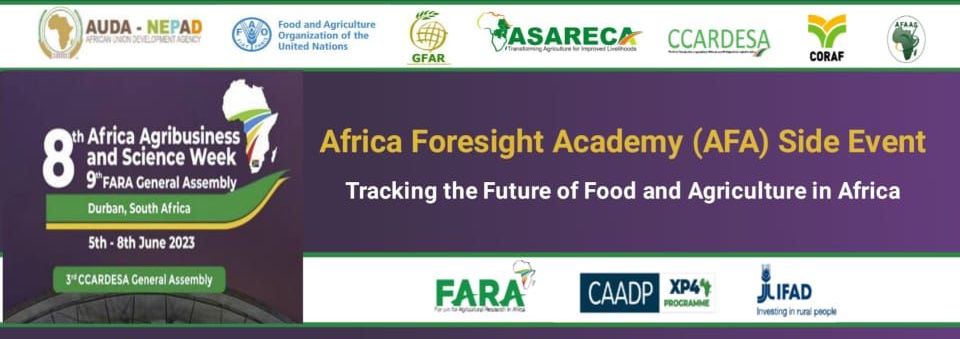June 5, 2023, In collaboration with FARA (Forum for Agricultural Research in Africa), Foresight4Food participated in Africa Foresight Academy (AFA) side-event at the 8th Africa Agri-business and Science Week in Durban, South Africa. The hybrid event was attended by foresight practitioners, developers and users of foresight results, and food systems experts from academia, research, extension, and health sectors, to discuss the future of food and agriculture in Africa.

The event focused on tracking the future of food and agriculture in Africa on the margins of AASW and was participated by a number of distinguished speakers from Foresight4Food, Forum for Agricultural Research in Africa (FARA), Food and Agriculture Organization (FAO), Global Forum on Agricultural Research (GFAR), Centre for Coordination of Agricultural Research and Development for Southern Africa (CCARDESA), Food Systems Foresight, African Forum for Agricultural Advisory Services (AFAAS), West and Central African Council for Agricultural Research (CORAF), and Association for Strengthening Agricultural Research in Eastern and Central Africa (ASARECA).
Bram Peters, Food Systems Programme Facilitator represented Foresight4Food at the side-event. he talked about the need of foresight to promote futures thinking for food systems transformation and the what Foresight4Food strives to achieve in this regard. He also talked about Foresight4Food’s collaboration with FARA and African partners including the foresight training of African researchers from FARA and African Foresight Academy and development of Massive Online Open Course (MOOC) on food systems foresight as well as what can be done to support anticipatory and adaptive food system governance in Africa.
The side-event featured Lorenzo Giovanni Belu, Senior Economist at FAO who discussed the future of food and agriculture in Africa, based on an FAO report: The future of Food and Agriculture – Drivers and Triggers for Transformation. Bram Peters shared his reflections on the report by talking about the need to change the paradigms of how we deal with food systems, economy, and nature as well as meaningfully discussion about power differences and global inequalities and the need to re-orient priorities building in systemic resilience, diversity, and focus on people’s well-being.